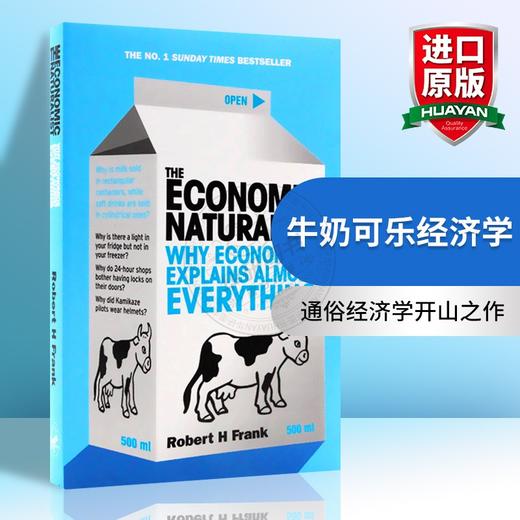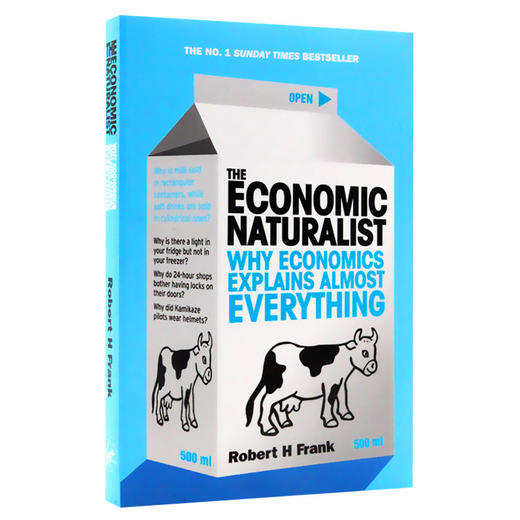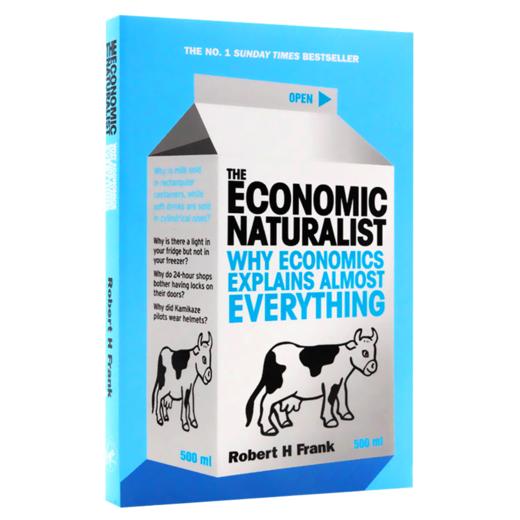牛奶可乐经济学英文原版 The Economic Naturalist 罗伯特弗兰克Robert H Frank 诺贝尔经济学奖得主罗伯特索洛推荐 英文版进口书
| 运费: | ¥ 0.00-999.00 |
| 库存: | 159 件 |
商品详情
依据《出版管理条例》,本书个别条目解释与中国实际情况不符,已做适当处理,但不影响任何整体阅读。此属正常情况,请事先知悉,以免给您带来不便。特此说明!!!
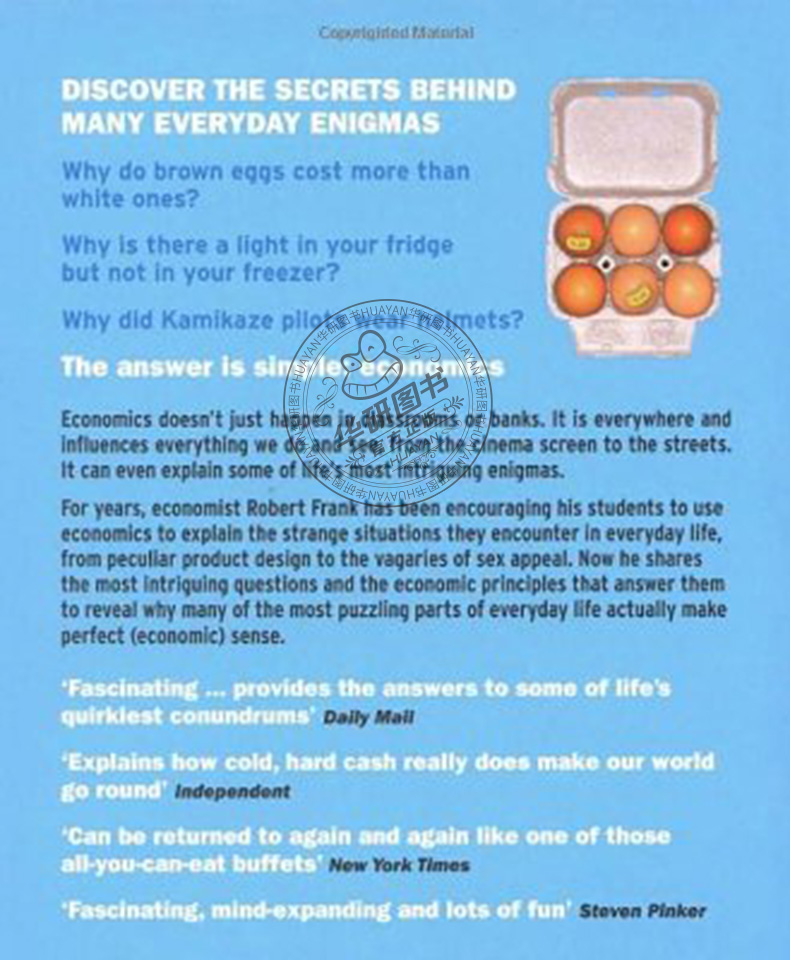
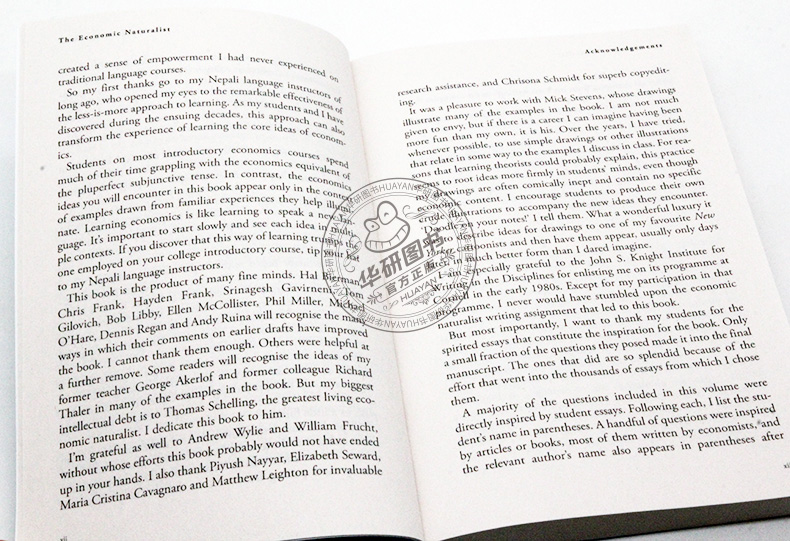
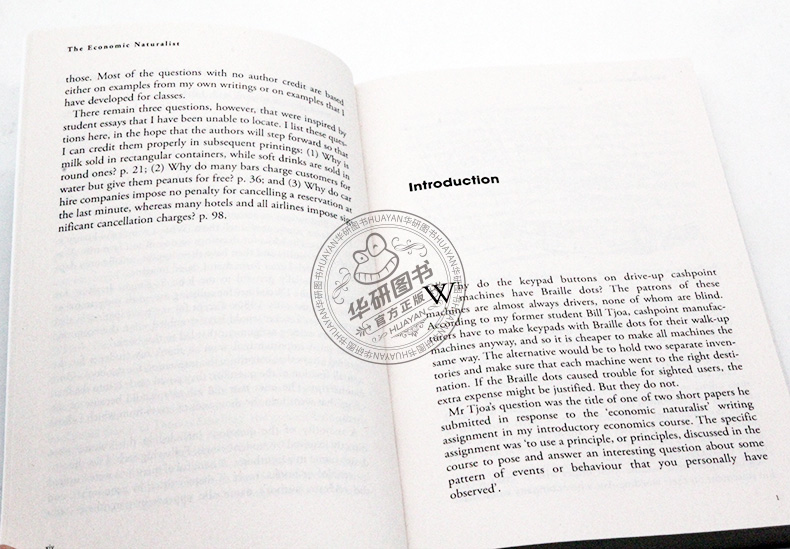
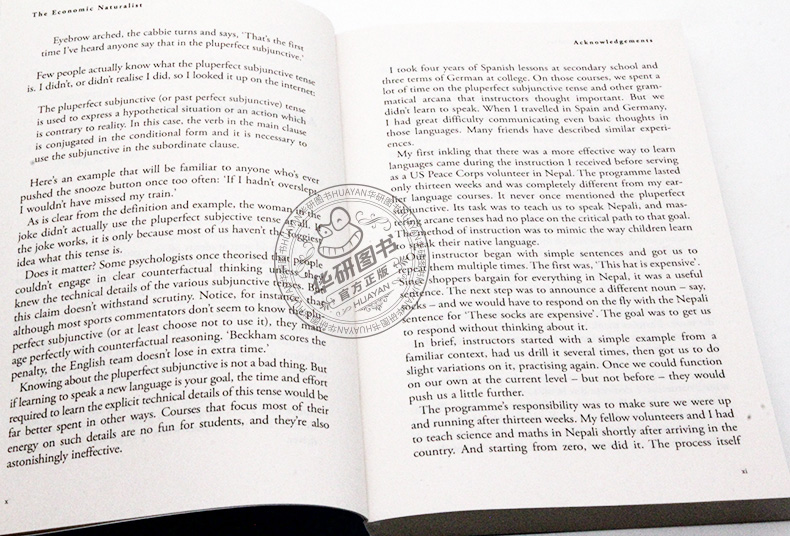

 书名:The Economic Naturalist牛奶可乐经济学
书名:The Economic Naturalist牛奶可乐经济学
作者:Robert H Frank
出版社名称:Virgin Books
出版时间:2008
语种:英文
ISBN:9780753513385
商品尺寸:13 x 1.6 x 19.4 cm
包装:平装
页数:256 The Economic Naturalist《牛奶可乐经济学》是用经济学的原理和方法来解释我们在现实中司空见惯而又未注意到的现象,并通过这些事例和解释来加深人们对经济学的理解。可以说是通俗经济学开山之作。
The Economic Naturalist《牛奶可乐经济学》是用经济学的原理和方法来解释我们在现实中司空见惯而又未注意到的现象,并通过这些事例和解释来加深人们对经济学的理解。可以说是通俗经济学开山之作。
精彩书评:
如果一开始就讲经济学原理,你一定会感到枯燥,但从这些你每天都见到,但从未问过为什么的现象入手,你一定会兴趣盎然,而且读完后会有醍醐灌顶之感,你会成为经济学的“粉丝”。——著名经济学家梁小民
弗兰克的书告诉我们,多多观察生活,就会发现有趣的东西,而且经济学基础概念会给这些行为和事件以合理的解释。这是学习经济学的好方法,适用于我们所有人。——诺贝尔经济学奖得主罗伯特·索洛
Have you ever wondered why there is a light in your fridge but not in your freezer? Or why 24-hour shops bother having locks on their doors? Or why soft drink cans are cylindrical, but milk cartons are square? The answer is simple: economics.
For years, economist Robert Frank has been encouraging his students to ask questions about the conundrums and strange occurrences they encounter in everyday life and to try to explain them using economics. Now in this bestselling book, he shares the most intriguing – and bizarre – questions and the economic principles that answer them to reveal why many of the most puzzling parts of everyday life actually make perfect (economic) sense.
Review
"Fascinating ... provides the answers to some of life's quirkiest conundrums"(Daily Mail)
"Explains how cold, hard cash really does make our world go round" (Independent)
"Can be returned to again and again like one of those all-you-can-eat buffets" (New York Times)
"Don't miss this addictive book. As Robert Frank and his students figured out dozens of everyday puzzles together, they produced ideas that are charming, curious, educational and lots of fun. Wonderful stuff." (Tim Harford, author of 'The Undercover Economist' and 'The Logic of Life')
"Fascinating, mind-expanding, and lots of fun"(Steven Pinker, author of The Blank Slate)
 如果你正在为买不买电影套票举棋不定,
如果你正在为买不买电影套票举棋不定,如果你正在为租婚纱还是买婚纱一筹莫展
如果你正在考虑换一份清闲的工作。
那么本书中千奇百怪的例子,加上妙趣横生的分析一定会对你有所帮助。
为什么牛奶装在方盒子里可乐却装在圆瓶子里?
为什么女士衣服的扣子在左边而男士的在右边?
为什么全新的二手车要比新车便宜得多
为什么餐厅都为饮料提供免费续杯?
为什么女模特要比男模特挣得多?
为什么大学教授说话语焉不详?
The Economic Naturalist《牛奶可乐经济学》是用经济学的原理和方法来解释我们在现实中司空见惯而又未注意到的现象,并通过这些事例和解释来加深人们对经济学的理解。比如,为什么牛奶的盒子是方的,可乐的瓶子是圆的;为什么酒吧中不值钱的水要收费而花生米却免费;为什么女模特的收入高于男模特。
虽说很多人以为经济学不可思议、难以理解,可它的基本原理简单又实际。根据具体事例理解这些原理,谁都能毫不费力地掌握它。本书收录的100多个事例是经济学家罗伯特·弗兰克在自己的经济学概论课上布置的书面作业,他要求学生利用经济学原理,探讨亲身观察到的事件或人们行为模式中的有趣问题,并将之写成普通人一看就懂的500字短文。仔细阅读本书,将教会您用经济学家的眼光看待生活和工作,并在不同的环境下巧妙地应用经济学原理。
如果你正在犹豫是否去商场的折扣卖场,如果你正在为买博物馆套票举棋不定,如果你正在为租婚纱还是买婚纱犯愁,如果你正在考虑换一份清闲的工作……那么这本书中千奇百怪的例子,加上妙趣横生的分析一定会对你有所帮助。
Discover the secrets behind hundreds of everyday enigmas
Why is there a light in your fridge but not in your freezer?
Why do 24-hour shops bother having locks on their doors?
Why did Kamikaze pilots wear helmets?
The answer is simple: economics
Economics doesn't just happen in classrooms or international banks. It is everywhere and influences everything we do and see, from the cinema screen to the streets. It can even explain some of life's most intriguing enigmas.
For years, economist Robert Frank has been encouraging his students to use economics to explain the strange situations they encounter in everyday life, from peculiar product design to the vagaries of sex appeal. Now he shares the most intriguing - and bizarre - questions and the economic principles that answer them to reveal why many of the most puzzling parts of everyday life actually make perfect (economic) sense.
'Can be returned to again and again like one of those all-you-can-eat buffets' New York Times
Robert H. Frank is the Henrietta Louis Johnson Professor of Management and Professor of Economics at Cornell University's Johnson Graduate School of Management. His previous books include The Winner-Takes-All Society (with Philip Cook), Luxury Fever and Principles of Economics (with Ben Bernanke). Frank's many awards include the Apple Distinguished Teaching Award and the Leontief Prize for Advancing the Frontiers of Economic Thought.
 罗伯特·弗兰克,博物经济学家、康奈尔大学约翰逊管理学院经济学和管理学教授、《纽约时报》经济专栏特约评论员。
罗伯特·弗兰克,博物经济学家、康奈尔大学约翰逊管理学院经济学和管理学教授、《纽约时报》经济专栏特约评论员。
弗兰克教授在20世纪80年代就开始在康奈尔的课堂上通过与学生问答的方式,收集本书中所讲到的生活中的经济学问题。经过二十多年的收集和整理,终于在2007年推出这本博物经济学著作。不同于传统经济学著作中充斥着艰涩的数学公式,本书中一个个妙趣横生的生活事例,将经济学化繁复为精妙。
《华盛顿邮报》这样评价他:弗兰克不是一位学术型经济学家。他主张经济学应该是一门根植于经验和观察的社会科学,而不是以数学为核心的硬科学。他的这本书把经济学从数学中解放了出来,并为其在人们的日常生活中生根发芽提供了无限的能量。
Robert H. Frankis the Henrietta Louis Johnson Professor of Management and Professor of Economics at Cornell University�0�8s Johnson Graduate School of Management. His previous books include The Winner-Takes-All Society (with Philip Cook), Luxury Fever and Principles of Economics (with Ben Bernanke). Frank�0�8s many awards include the Apple Distinguished Teaching Award and the Leontief Prize for Advancing the Frontiers of Economic Thought.
Cartoons are data. That people find them amusing usually tells us something about reality. Curious about what drove responses to the economist cartoon, I began asking about the disappointed looks that appeared on people's faces when they first discovered I was an economist. Invariably they mentioned unpleasant memories of an introductory economics course. `There were all those incomprehensible graphs,' was a common refrain.
Needless to say, a course can be valuable even if unpleasant. Unfortunately, however, most students seem to emerge from introductory economics courses without having learned even the most important basic principles. According to one recent study, their ability to answer simple economic questions several months after leaving the course is not measurably different from that of people who never took a principles course.
What explains such abysmal performance? One problem is the encyclopedic range typical of introductory courses. As the Nobel laureate George J. Stigler wrote more than 40 years ago, `The brief exposure to each of a vast array of techniques and problems leaves the student no basic economic logic with which to analyze the economic questions he will face as a citizen.'
Another problem is that the introductory course is increasingly tailored not for the majority of students for whom it will be their only economics course, but for the negligible fraction who will go on to become professional economists. These courses prove daunting for many students and leave them little time and energy to focus on how basic economic principles help explain everyday behaviour.
The good news is that an approach that has revolutionized the teaching of foreign languages promises similar gains in economics and other disciplines. Just as a few simple sentence patterns enable small children and students of a second language to express an amazing variety of thoughts, a few basic principles do much of the lifting in economics. If someone focuses on only these principles and applies them repeatedly in examples drawn from familiar contexts, they can be mastered easily in a single week.
The form in which ideas are conveyed is important. Perhaps because our species evolved as storytellers, the human brain is innately receptive to information in narrative form. Years ago, I stumbled upon an assignment that plays directly to this strength.
Twice during the semester, I ask my students to pose an interesting question based on something they have personally observed or experienced. In no more than 500 words, they must then use basic economic principles to answer it. I call it the `economic naturalist' assignment, in the spirit of field biologists who use Darwinian principles to interpret the traits and behaviour of living things.
A high proportion of my students' papers invoke the cost-benefit principle, which says that a rational person should take only those actions whose benefits exceed their costs. This principle can help explain otherwise mysterious patterns of government regulation. My former student Greg Balet asked, for example, why parents are required to strap toddlers into a safety seat for even a short drive to the supermarket, yet are permitted to fly from London to New York with toddlers on their laps.
One answer might be that if a plane crashes, it won't much matter if toddlers are in safety seats. But Mr. Balet argued that because the real benefit of restraining devices in aeroplanes is preventing injuries caused by air turbulence, safety seats would be as useful in planes as in cars.
The explanation must lie on the cost side, he said. Once you've set up a child safety seat in your car, it costs nothing additional to use it. If you're on a full flight from London to New York, however, you must buy an extra ticket in order to use a safety seat, which might cost you a significant amount of money.
Safety seats are thus more likely to pass the cost-benefit test in cars than in planes. (Economists have a simple response to those who object that costs should play no role in safety decisions: `Do you get your brakes checked on your way to work each morning?')
Basic economic principles are not rocket science. They are accessible even to children. Lance Knobel, for example, who writes the blog DavosNewbies.com, said that he'd been regaling his 11-year-old son with economic naturalist puzzles at bedtime, `and he can't get enough of them.'
In the kingdom of the blind, the one-eyed man is king. By the time you finish reading The Economic Naturalist, you will be an economics expert, relatively speaking. Having seen how basic economic principles help us answer interesting questions from everyday experience, you won't be able to resist posing and answering interesting new questions of your own.
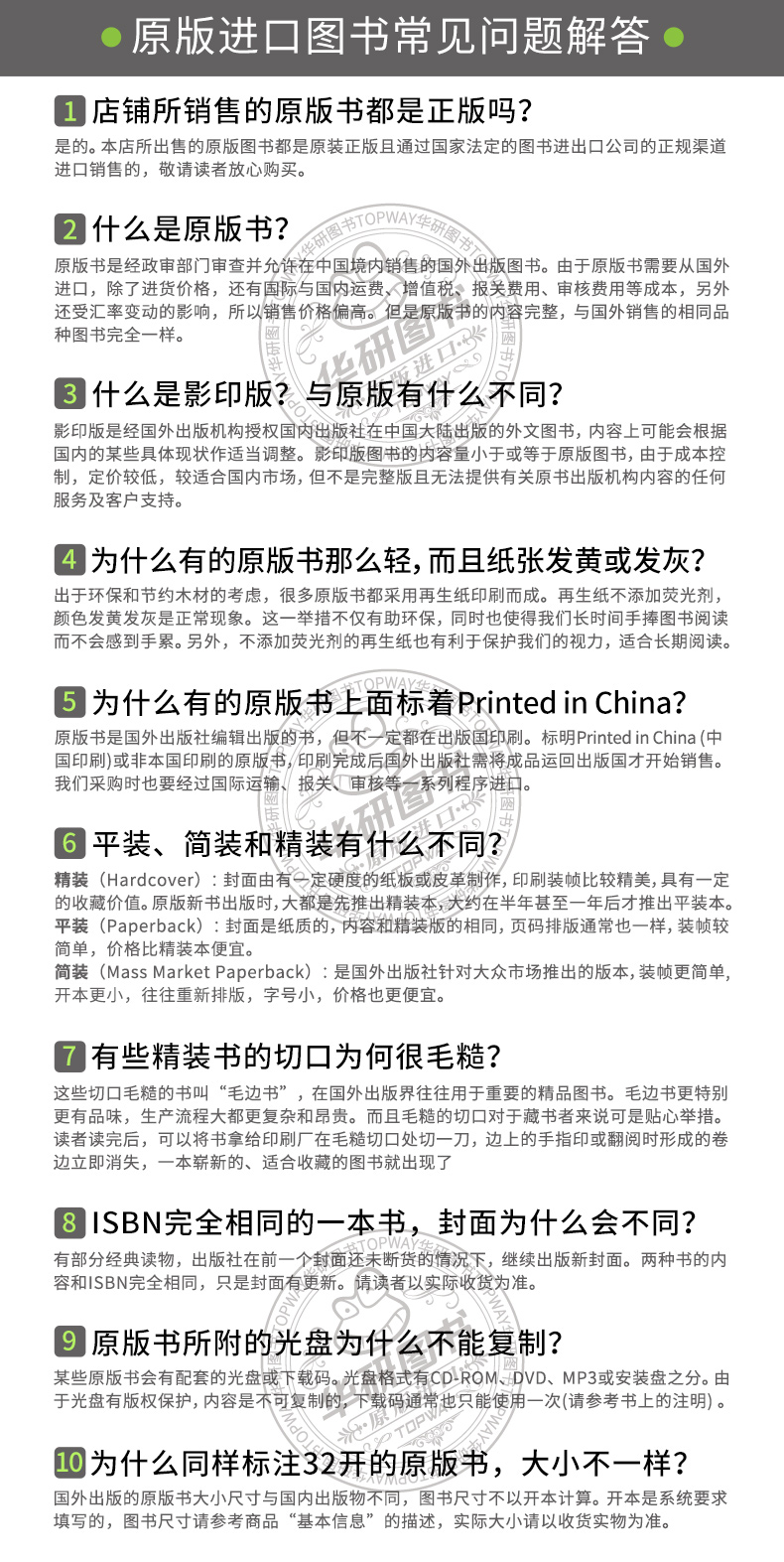
- 小花生网 (微信公众号认证)
- 和你分享世界上先进的教育资源
- 扫描二维码,访问我们的微信店铺
- 随时随地的购物、客服咨询、查询订单和物流...
